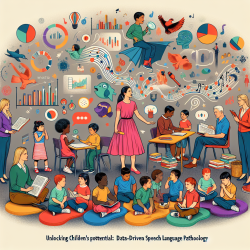As speech-language pathologists (SLPs), our ultimate goal is to provide the most effective interventions to support children's communication development. The recent pilot study titled "School-Aged French-Speaking Children's Word Finding in Narration: A Pilot Study" offers valuable insights that can help practitioners enhance their assessment and intervention strategies for word-finding difficulties (WFD) in French-speaking children.
Key Findings from the Study
This study, conducted by Vincent Bourassa Bdard and Natacha Trudeau, aimed to collect preliminary data on the frequency of word-finding behaviors in narration and to determine if there is a relationship between these behaviors and picture naming task scores. Here are the key findings:
- The frequency of word-finding behaviors such as delays, repetitions, and interjections were observed in the narration tasks.
- No significant correlation was found between word-finding behaviors in narration and picture naming task scores.
- Using normative data from the Test of Word Finding in Discourse (TWFD) may not be appropriate for French-speaking children in narration contexts.
Implications for Practitioners
Based on these findings, SLPs working with French-speaking children can consider the following strategies to improve their practice:
1. Diversify Assessment Tasks
Given the lack of significant correlation between narration and picture naming tasks, it is crucial to include a variety of assessment tasks to get a comprehensive understanding of a child's word-finding abilities. This could include:
- Narration tasks where children are asked to tell a story from a picture or a story stem.
- Picture naming tasks to assess the child's ability to retrieve specific words.
- Word-picture matching tasks to evaluate the child's comprehension and retrieval processes.
2. Be Cautious with Normative Data
The study suggests that normative data from the TWFD may not be suitable for French-speaking children in narration contexts. Therefore, practitioners should be cautious when using these norms and consider the cultural and linguistic context of their clients. Future research should aim to develop normative data specific to French-speaking populations.
3. Focus on Individualized Interventions
Since word-finding difficulties can manifest differently across tasks and individuals, it is essential to tailor interventions to each child's specific needs. Practitioners can use the following approaches:
- Identify and target specific word-finding behaviors such as repetitions or interjections in narration.
- Use a combination of semantic and phonological strategies to enhance word retrieval.
- Incorporate storytelling and narrative-based activities to improve overall language skills.
Encouraging Further Research
While this pilot study provides valuable preliminary data, further research with larger sample sizes and diverse populations is necessary to develop robust assessment tools and intervention strategies for French-speaking children with word-finding difficulties. Practitioners are encouraged to contribute to and stay updated with ongoing research in this area.
To read the original research paper, please follow this link: School-Aged French-Speaking Children's Word Finding in Narration: A Pilot Study.










